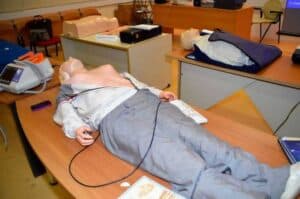Educational Environment

Education
Educational Environment
Medical Simulation
Medical Simulation Center for Clinical Cases
Academic Advisor
student support and counseling
Student log-book
Student attendance form
Erasmus+
Students’ mobility for traineeship
Internship
Internship opportunities
General Information
Ensuring academic and reasearch activities
Medical Simulation Center

The Medical Simulation Center, either computer-based or with the use of simulated human patients, aims at promoting learning effectively, without endangering patients’ lives.
It advances the acquisition of clinical skills in a variety of critical clinical conditions, inside and outside the operating room, which require immediate treatment, in a prioritized and disciplined manner, within a limited period of time. At the same time, the procedure is recorded and the trainee’s performance is evaluated.
The advantage of using simulators is that they can be programmed tailored to specific educational needs, simulating a number of selected conditions and complications and allowing the trainees to expand their knowledge and skills without endangering patients.
The Medical Simulation Center of the Faculty of Medicine at the School of Health Sciences run by the Anesthesiology Department, and more about the center is here.
Academic Tutor
Considering that academic tutoring contributes decisively to students’ successful education, the Faculty of Medicine has approved the Regulation of Academic Tutor in order that academic tutors undertake students’ guidance.
The role of the academic tutor is stipulated by article 35 (Law 4009_2011 Government Gazette Issue A 195) which states that “The academic tutor guides and supports students in their programmes of study. The Internal Regulation of every Institution allocates the role of the academic tutor to professors on a rotating basis…..”.Additional information about the role of the Academic Tutor and the corresponding legislative framework can be found in this link (in greek).Template of student record (in greek), the meeting record (A10a) and the semi-annual meetings summary form (A10b), need to be filled in by the Academic Tutor, as well as the updated file (01.10.25) from which the students are able to find their Tutor (in greek).
E-course
The University of Ioannina offers the possibility of accessing the asynchronous distance learning platform by all students.
The existence of an active academic account is a prerequisite, while the following groups have access rights:
- Active students of the University of Ioannina of all study programms (undergraduate, graduate, doctoral candidates and postdoctoral fellows)
- Active teaching staff of the University of Ioannina (Faculty members, EDIP, EEP, contract teachers)
Access to the distance learning platform is via the link https://ecourse.uoi.gr
Logbook
The student logbook is an institution in medical education that identifies the basic characteristics of the student’s clinical and laboratory education.All students are required to keep a logbook, which records the various stages of their education. The education advisor or education manager of each Educational Cycle (rotation), checks, evaluates and endorses the logbook of each student.Students are required to record in their personal logbook the actions and skills of the Learning Objects with indicative data of the patients and a brief description of their treatment.For the Department of Medicine of Ioannina, indicatively, the corresponding clinical characteristics in which the students of the undergraduate curriculum are trained are shown here: for General Medicine, for Anesthesiology, for Cardiology, for Obstetrics & Gynaecology, for Neurology, for Internal Pathology and for Pediatrics.Erasmus+
Erasmus+ is the European Commission’s programme for education, training, youth and sport, which aims to enhance skills and employability as well as to modernise education, training and youth systems, in all areas of Lifelong Learning (Higher Education, Vocational Education and Training, Adult Education, School Education, youth activities, etc.).
Internship
The Internship, based on an experiential method of teaching, is supported by the Faculty of Medicine of the University of Ioannina to further strengthen the student-centered undergraduate curriculum. Students have the opportunity to work for a short period of time, in a real-world environment before obtaining their medical degree.
The Internship is integrated to the undergraduate curriculum:
- As an optional elective course with code IAE511 and title “INTERNSHIP” providing with 2 additional ECTS.
Under the Student Support Unit of the University of Ioannina (SSU), the Internship Office implements the “Higher Education Internship Program of the University of Ioannina”, co-financed by Greece and the European Social Fund (ESF+) through the “Human Resources and Social Cohesion” Program of the Partnership Pact for the Development Framework 2021-2027. This programme supports the optional elective course. Medical students respond with enthusiasm to the calls. Each academic year, at least 40 medical students are placed in Institutions that are linked to the health sector and provide clinical or research work.
- As a mandatory course for medical students of the 6th year of studies through the course with code IAY807 and title “GENERAL MEDICINE – INTERNSHIP IN PRIMARY HEALTH CARE“. Thus, all medical students are given the opportunity to gain experience and exposure in a real world environment of Primary Health Care in order to familiarize themselves with the obligations, possibilities and challenges that they may encounter right after their graduation.
The Internal Regulation for the Internship in the Faculty of Medicine can be found here (in greek).

